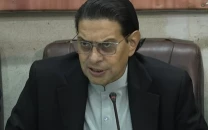At odds: Hiring of chairman drug court challenged
Govt terms SHC suo motu action as an improper exercise of judicial powers.

Govt terms Sindh High Court suo motu action as an improper exercise of judicial powers.. PHOTO: EXPRESS
Challenging the Sindh High Court (SHC) April 15 order regarding the suspension of a notification on the appointment of Chairman Drug Court in Karachi, the federal government has contended that the initiation of suo motu proceedings in this matter is entirely an improper exercise of judicial powers.
The government through the law ministry has moved a petition in the apex court, seeking suspension of the SHC order, wherein the high court converted the note of its registrar into a constitutional petition and suspended the notification regarding the appointment of a drug court chairman.
Earlier, the law ministry requested the SHC for a panel of candidates for appointment of the drug court chairman. Upon this, the SHC on April 6 forwarded three nominations for this post.
On April 8, Prime Minister Nawaz Sharif approved the appointment of Khalid Mumtaz as chairman whose name was at serial No 2 of the panel.
However, SHC registrar on April 14 put up a note before the chief justice stating therein that Sofia Latif, retired district and sessions judge, was nominated for the post of chairperson Drug Court, Karachi while the law ministry had notified Khalid Mumtaz for the same position.
Upon this, the SHC chief justice was pleased to convert this note into a constitutional petition and fixed it before Division Bench-II. On the following day, the Division Bench of the High Court suspended the operation of the notification.
The law ministry in its petition contended that the high court does not have jurisdiction to issue a writ in suo motu jurisdiction while there was neither any writ of quo warrant nor any person challenged appointment of Khalid Mumtaz as chairman drug court, Karachi.
According to the law ministry’s plea: “The high court in such cases should have to confine only to relief claimed and has no jurisdiction in suo motu jurisdiction to suspend the appointment notification, therefore, instant proceedings are liable to be set aside/quashed being void and without jurisdiction.”
It also says that the SHC has violated Article 10A of the Constitution which was newly incorporated through the 18th Constitutional Amendment.
The law ministry objected that the right of hearing was not given to the law ministry as well as Khalid Mumtaz, which was adversely affected due to ex parte proceedings by the high court.
The petition states: “Therefore, inviolable constitutional right was not given to the petitioner and respondent No.2 the impugned order is illegal, violation of the Constitution and is not sustainable under the law,”
The plea says that sub-section (2) of section 31 of the Drugs Act, 1976 provides that the chairman of the Drug Court shall be a person who is, or has been or is qualified for appointment as a judge of a high court.
“The respondent No.2 [Khalid Mumtaz] was qualified to be appointed as judge of a High Court and the appointing authority has exercised power vested in him. When the law provides for a thing to be done in a particular way, it should have been done in that way and in no other way,” it said.
The law ministry says this petition is filed only to have an authoritative pronouncement on its legal aspect.
Published in The Express Tribune, June 15th, 2015.



















COMMENTS
Comments are moderated and generally will be posted if they are on-topic and not abusive.
For more information, please see our Comments FAQ